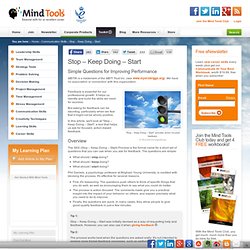

Dealing with Unfair Criticism - Communications Skills Training from MindTools. Responding Calmly and Rationally to Unwarranted Criticism © iStockphoto/lisafx You're presenting the draft marketing plan for a new product at your team meeting.

The Stop - Keep Doing - Start Process - Communication Skills Training From MindTools. Simple Questions for Improving Performance MBTI® is a trademark of the MBTI Trust Inc.

(see www.myersbriggs.org). We have no association or connection with this organization. "Stop – Keep Doing – Start" provides action focused feedback. The alternative MR MEN that you need to watch out for! I’ve recently been on an ACAS training day where I had absolute pleasure in listening to Mr Martin Smith of ITC Consultancy (www.taking-control.co.uk).

Martin has had a varied background that ranges from working as a Police Officer to being a practising psychotherapist. Using his knowledge that he graciously shared with us, I have put together an alternative MR MEN Matrix for you to consider when dealing with difficult and challenging behaviours that maybe demonstrated by your own health and social care colleagues. Emotional Intelligence - Develop your emotional intelligence with MindTools.com.
Developing Strong "People Skills" Develop your emotional intelligence, with James Manktelow and Amy Carlson.

15 Simple Ways to Overcome Anger - Global One TV: A Blog for Mystics. Courtesy of ThinkSimpleNow.com Can you recall the last time you were really angry at someone?

So much so that you were physically shaken just at the thought of them? Rarely does this feeling of anger help us in getting what we want. Often, it will work against us, resulting in more pain, unnecessarily. Two Lists You Should Look at Every Morning - Peter Bregman. By Peter Bregman | 11:00 AM May 27, 2009 I was late for my meeting with the CEO of a technology company and I was emailing him from my iPhone as I walked onto the elevator in his company’s office building.

I stayed focused on the screen as I rode to the sixth floor. I was still typing with my thumbs when the elevator doors opened and I walked out without looking up. Then I heard a voice behind me, “Wrong floor.” I looked back at the man who was holding the door open for me to get back in; it was the CEO, a big smile on his face. The world is moving fast and it’s only getting faster. So we try to speed up to match the pace of the action around us. Stop Worrying about Your Weaknesses - Peter Bregman. 174,203 Things You Can Do Instead of Watching TV. How to Run Away from All Your Problems. Do you want to run away from all your problems?

7 Ideas For Expanding Your Creativity and Comfort Zone. Do you think outside the box?

What does “thinking outside the box” even mean and why is it important? I believe the following definition I found on Answers.com explains it very well. Breaking away from traditional or conventional thought to develop a unique, superior solution to a difficult problem.~ Dictionary of Business Terms. Ten Principles To Live By In Fiercely Complex Times. Why Self-Compassion Trumps Self-Esteem. In this incredibly competitive society of ours, how many of us truly feel good about ourselves?

I remember once, as a freshman in college, after spending hours getting ready for a big party, I complained to my boyfriend that my hair, makeup, and outfit were woefully inadequate. He tried to reassure me by saying, “Don’t worry, you look fine.” 7 Ways to Enhance Focus, Creativity, Productivity and Performance. Back in my corporate lawyer days, there was one guy who everyone hated. Not because he was mean or underhanded or cut-throat. He was actually quite nice and always willing to help. Nine Things Successful People Do Differently - Heidi Grant Halvorson. Learn more about the science of success with Heidi Grant Halvorson’s HBR Single, based on this blog post.

Why have you been so successful in reaching some of your goals, but not others? If you aren’t sure, you are far from alone in your confusion. It turns out that even brilliant, highly accomplished people are pretty lousy when it comes to understanding why they succeed or fail. The intuitive answer — that you are born predisposed to certain talents and lacking in others — is really just one small piece of the puzzle. In fact, decades of research on achievement suggests that successful people reach their goals not simply because of who they are, but more often because of what they do. Book - 9 insights on life. 25 Beautifully Illustrated Thought-Provoking Questions. 405 Flares Facebook 137 Twitter 5 Google+ 194 StumbleUpon 1 Pin It Share 68 68 405 Flares × A question that makes you think is worth asking… At the cusp of a new day, week, month, or year, most of us take a little time to reflect on our lives by looking back over the past and ahead into the future.
We ponder the successes, failures and standout events that are slowly scripting our life’s story. This process of self reflection helps us maintain a conscious awareness of where we’ve been and where we intend to go. It is pertinent to the organization and preservation of our dreams, goals and desires. Remember, these questions have no right or wrong answers. Here’s a sample of 25 recent thought questions posted on the site: Few extra questions. 75 Reminders for Tough Times. 30 Things to Stop Doing to Yourself. 7 Lessons From 7 Great Minds.
Have you ever wished you could go back in time and have a conversation with one of the greatest minds in history? Well, you can’t sorry, they’re dead. Unless of course you’re clairaudient, be my guest. But for the rest of us, we can still refer to the words they left behind. Even though these great teachers have passed on, their words still live, and in them their wisdom. eCVconsultancy - Blog.